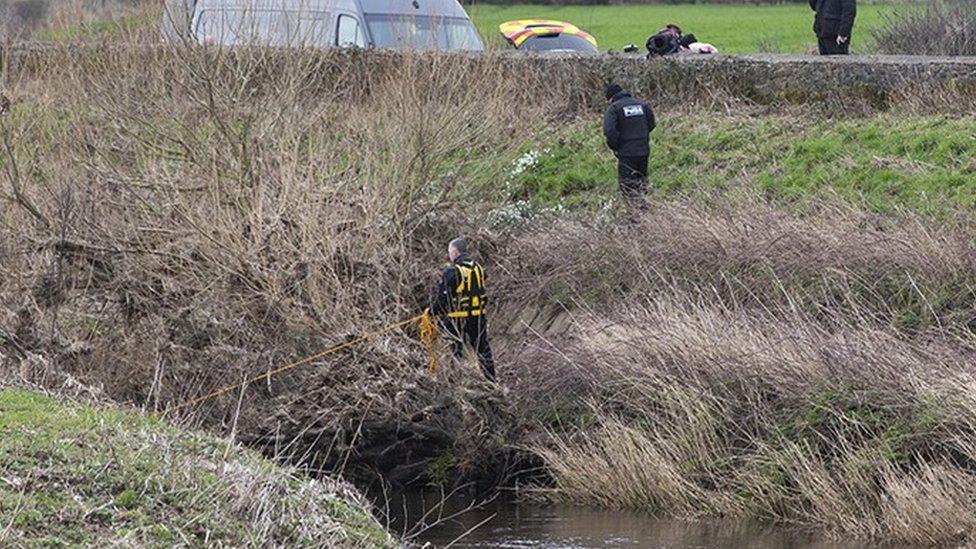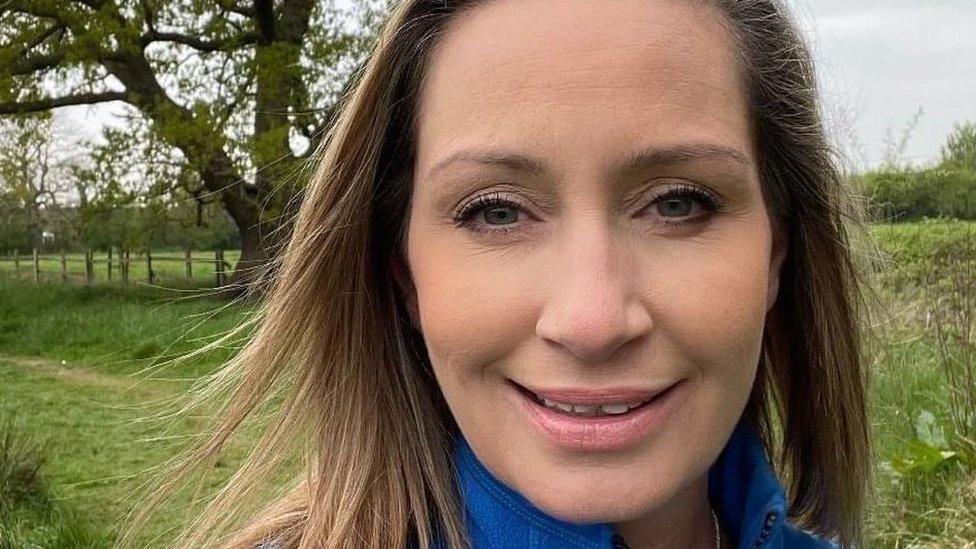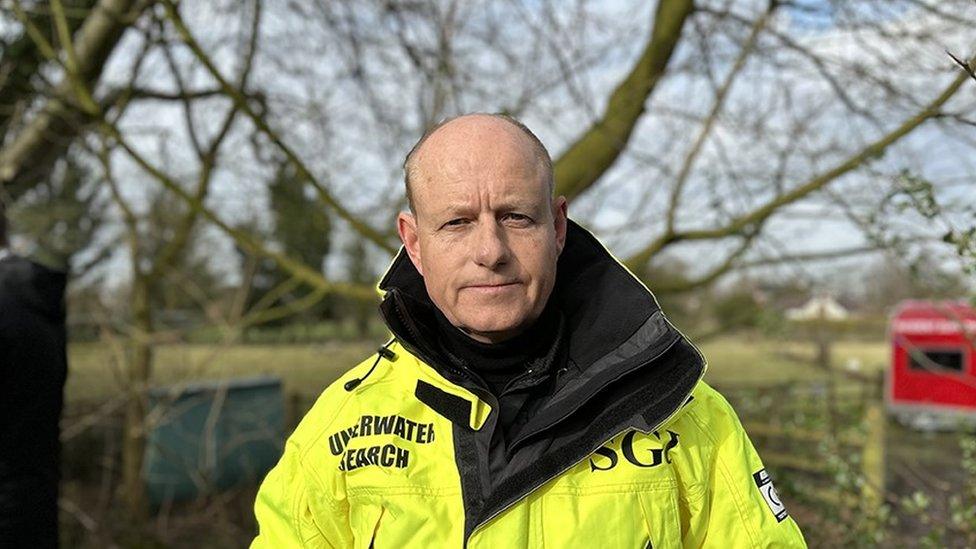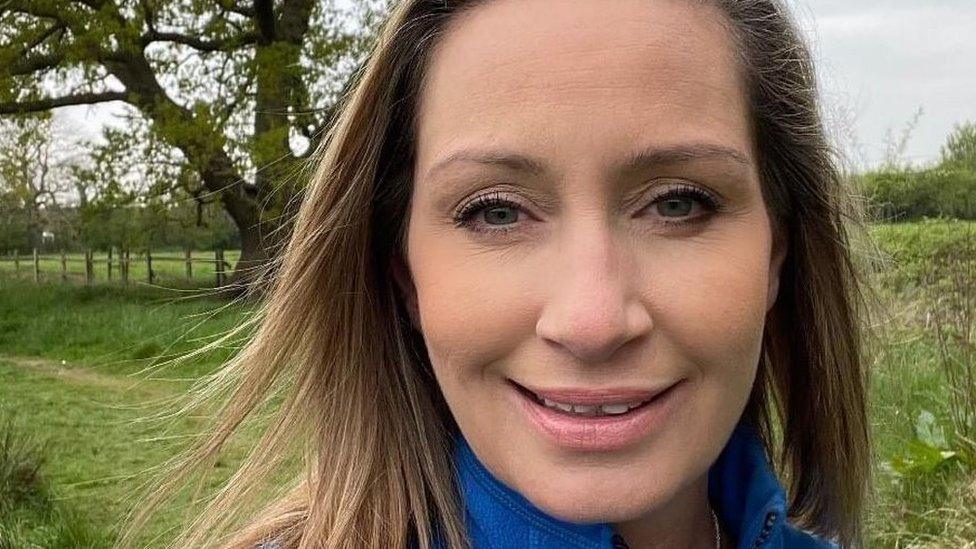Nicola Bulley review: Key report findings at a glance
- Published

Nicola Bulley disappeared while out walking her dog on 27 January
An independent review of Lancashire Police's handling of Nicola Bulley's disappearance has been published.
The mother-of-two was walking her dog when she went missing in January prompting a huge search before her body was eventually found in the River Wyre.
The College of Policing report praises the investigation into the 45-year-old's disappearance but criticises its media strategy.
We look at some of the key findings in the 143-page report, external.

Investigation and search

The police search and investigation into Nicola Bulley's disappearance was commended in the report
The report praised the police investigation and search itself, describing it as "very well conducted and resourced".
The resourcing and execution of the search strategy was "extensive, comprehensive and commendable", the review found.

Disclosure of personal information

Nicola Bulley's body was found in the River Wyre three weeks after she disappeared
Lancashire Police was criticised for revealing "highly sensitive" personal information that Ms Bulley had been struggling with the menopause and alcohol issues. It was "avoidable and unnecessary", the review concluded.
The review found the force should have given non-reportable background briefings to accredited journalists to shape responsible reporting, without releasing personal information.
It said: "The way in which this information was eventually communicated to the public proved to be the most controversial aspect of the investigation.
"The failure to brief the mainstream media on a non-reportable basis on this information, or to adequately fill the information vacuum, allowed speculation to run unchecked."

Critical incident
The failure to call the investigation a critical incident earlier on, despite meeting the national definition, led to several challenges, the report said.
The declaration on 16 February, almost three weeks after she went missing, was "so late that it was rendered ineffective", the report said.
It concluded Ms Bulley's disappearance should have been declared to be a critical incident as early as 30 January.
The decision failed to take into account the "exceptionally high media and public interest" in the investigation and "hampered" the force's ability to control the narrative and undermined public confidence," the report found.
Ms Bulley's body was found three weeks after she disappeared, with a coroner later finding she had fallen into the river accidentally.

Media
The review found the trust between police and the media broke down with senior officers failing to brief mainstream accredited reporters leading to unchecked speculation.
It said this led to an extraordinary increase in media and public interest in the case "fuelled by several newsworthy elements" including the apparent mystery of why Ms Bulley had disappeared, leaving behind her dog and leaving her mobile phone still connected to a Microsoft Teams call.
It said the force's media handling and communication led to "a breakdown of public confidence".
The report said the relationship between police and accredited media has become fractured and action must be taken on all sides to rebuild trust.

Peter Faulding

Underwater search expert Peter Faulding's role in the search for Nicola Bulley was examined in the review
The report said Lancashire Police felt the behaviour and engagement with the media of the underwater search expert Peter Faulding "caused challenges to the investigation" by discussing the case with the media and he had "behaved insensitively" to the family at an "extraordinarily difficult time".
Mr Faulding, leader of underwater search experts Specialist Group International (SGI), was asked by Ms Bulley's family to help with the search.
The report said: "The review team considers that some of his actions created a more challenging environment for the investigation team.
"His public statements often contradicted the investigative and operational approach, leading to confusion for the public and reducing the family's trust in the investigation and search operation."

Social media
The search for Ms Bulley drew "unprecedented levels" of social media interest attracting some amateur detectives and social media users to the area.
Wild speculation and conspiracy theories on social media put the force under intense pressure during the investigation into Ms Bulley's disappearance.
Lancashire Constabulary press office logged more than 75,000 inbound social media comments on the Nicola Bulley case over a period of around a month, the report said.
Dr Iain Raphael, who led the review, said policing must "recognise the impact social media now has".
"Ultimately, police should seek to be the first with the truth and ensure the public has access to accurate and authoritative information when it is most needed."

Reaction to the report

Lancashire police and crime commissioner Andrew Snowden said opportunities were lost in the media strategy
Andrew Snowden, Lancashire police and crime commissioner, who commissioned the independent report, said: "Whilst the investigation into Nicola's disappearance was found to be well handled and resourced, the media narrative was lost at an early stage, which had a detrimental impact on Nicola's family and friends, and also the confidence of the wider community.
"Opportunities for non-reportable media briefings on her medical history and vulnerabilities, or sharing her status as a high-risk missing person were not taken."
Lancashire Police's Deputy Chief Constable Sacha Hatchett said the huge media and social media interest in the "tragic case" was "at times overwhelming".
"With the benefit of hindsight, there are undoubtedly things we would do differently in the future. Indeed, we have already started to do so," she said.
On the release of personal information, she said: "The release of the information was lawful, but that doesn't mean that we don't recognise the impact that this had."
She added: "The decision making process was thorough, considered and based on the substantial risk posed at that time in the investigation."
In a seven-page response, external to the findings, Mr Faulding said there were several statements in the report which did not reflect the actual events.
"If at any time I was asked to stop updating the media, I would have immediately, but no request was ever made," he said in the statement.
He denied he had signed any NDAs, adding: "The only instructions I was given was to use discretion and keep operational information confidential. I was never given any operational information and never disclosed any."

Why not follow BBC North West on Facebook, external, X, external and Instagram, external? You can also send story ideas to northwest.newsonline@bbc.co.uk, external
- Published21 November 2023

- Published27 June 2023

- Published22 February 2023

- Published22 February 2023

- Published21 February 2023